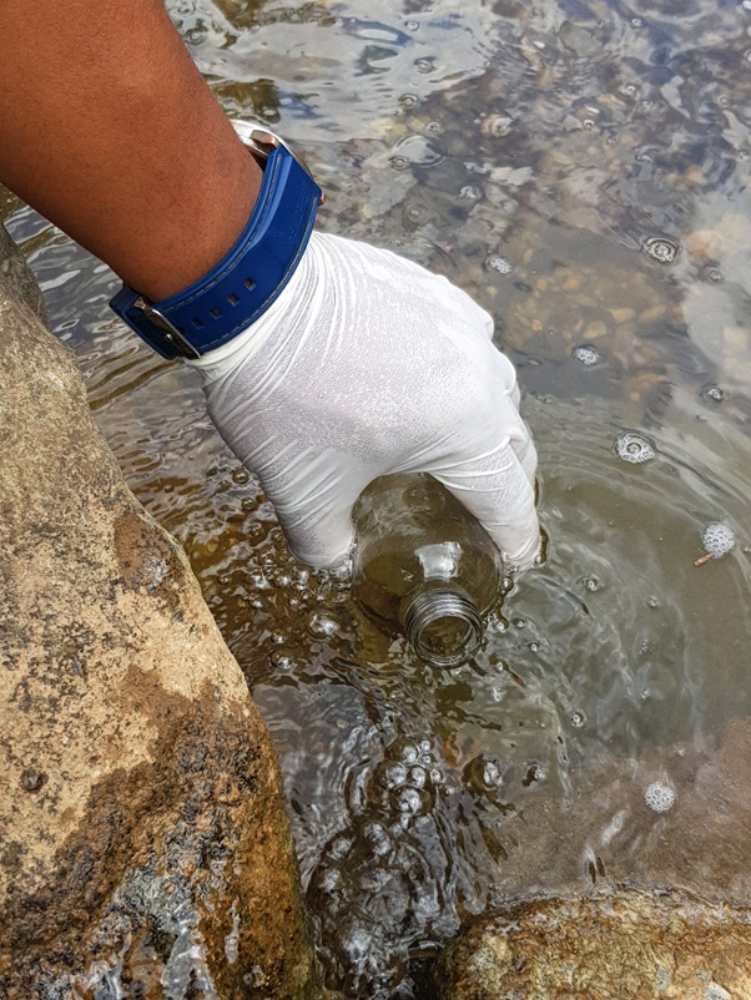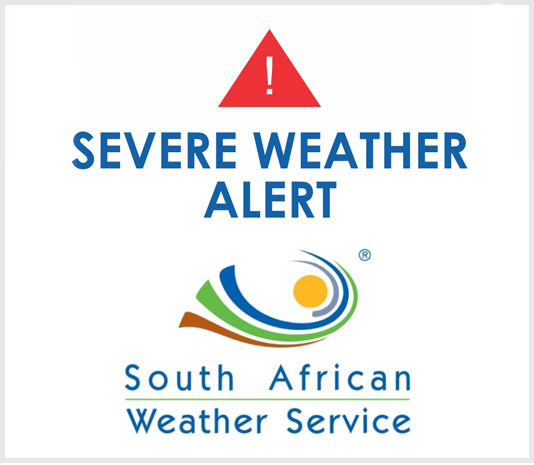Author: Herman Pieters
Gender Based Violence and Femicide Summit
Garden Route District Municipality in collaboration with the South African Police Service and the Western Cape Department of Community Safety, today and tomorrow, 25-26 November 2019, will host a Gender-Based Violence Summit at the Conville Community Centre in George.
The Summit includes government, civil society and other role-players in an effort to find solutions to the scourge of gender-based violence that plague communities. The summit also serves as a platform for victims to share experiences and find collective solutions to issues.
On the end of the two-day summit, participants develop a list of priority actions that will outline a roadmap to a Garden Route free from Gender-Based-Violence.



Smutsville and Sizamile Street Vendors receive training
Garden Route District Municipality’s (GRDM) Environmental Health Practitioners (EHPs) from Knysna, Mr Mtetho Sithonga and Ms Mendy Tyhawana, presented an information and awareness session on 13 November 2019 to Informal Food Traders – also known as street vendors. These traders currently run their businesses in the Smutsville/Sizamile areas.
According to the traders, they primarily see a spike in business over weekends when they sell braai meat in front of taverns and on street corners.
In view of the information and awareness sessions provided by EHPs, Mr Johan Compion, Manager: Municipal Health and Environmental Services, said: “Ongoing health and hygiene education sessions play an essential role in the practices of food traders”. He also confirmed the following: “Improper food handling practices, inadequate temperature control and poor food storage practices, as well as improper cleaning of equipment and utensils, cause foodborne illnesses.”
During last week’s session, EHPs focused on the five keys to safer food, compliance issues and incentives for those adhering to food safety standards.
The keys to safer food deal primarily with:
- Keep clean (dealing mainly with hygiene practices);
- Separate raw from cooked food (deals mainly with how to handle and keep raw food and cooked food apart to prevent cross-contamination);
- Cook food thoroughly (deals mainly with the technique of cooking to ensure all the microorganisms that were in the food are killed);
- Keep food at safe temperatures (this key focus on safe temperatures of storing cooked or raw food and the importance of not breaking the cold chain and the consequences of not adhering to that); and
- Use safe water and raw materials (importance of knowing the source of the water you use is safe or not safe, if not, how do you ensure that the water is safe. The raw material you use e.g. meat products, vegetables, etc. are from credible sources meaning they are being checked and authorised to trade.)
Mr Mtetho Sithonga, EHP and one of the presenters of the session, said: “Food safety is about producing, handling, storing and preparing food in such a manner, which prevents infection and contamination of food”. It is especially important to have Good Manufacturing Practices (GMPs) for food in the big production chains as well. “In other words, food safety helps to promote good health by ensuring wholesomeness of food,” said Sithonga.
The crux of the matter is that education sessions promote the importance of public health. While awareness sessions remind food traders about the importance of a “health first” approach – so do inspections and enforcement. These mechanisms require synergy and ongoing collaboration between the public and private sectors to make things work to the standard it was intended to by law. Strict adherence to standards and best practices is required for every food trader because they are the final point of sale of foodstuffs.
If anyone becomes aware of any suspicious food trading activities, or would like to lodge an anonymous complaint, contact the GRDM Municipal Health Services Department at 044 – 803 1522 or send the details to info@gardenroute.gov.za
World Day of Remembrance exists to pay tribute to road traffic victims and their families, as well as to recognize the work of professionals who act after a road crash.
The type of road mobility that is in place throughout the world still fosters an unbearable number of deaths, serious injuries and illnesses every year, both as the immediate consequence of road traffic crashes and through air pollution.
 Here are some scary statistics published by the United Nations Road Safety Collaboration:
Here are some scary statistics published by the United Nations Road Safety Collaboration:
– Each year nearly 1.3 million people die as a result of a road traffic collision— more than 3000 deaths each day
— More than half of these deaths are of people who are not even travelling in a car.
– 20 to 50 million people sustain non-fatal injuries from a collision, and these injuries are an important cause of disability worldwide.
– 99% of road traffic deaths occur in low- and middle-income countries, which claim less than half the world’s registered vehicle fleet.
– Road traffic injuries are among the three leading causes of death for people between 5 and 44 years of age.
To read the “Global Plan for the Decade of Action for Road Safety 2011 – 2020, follow this link: https://buff.ly/32Ch2bV
World Day of Remembrance
#RoadSafety
#WDR
#wdor2019
Media Release: LED & SCM Indaba underway in Mossel Bay
Media Release: LED & SCM Indaba underway in Mossel Bay
For Immediate Release
20 July 2020
A two-day Local Economic Development (LED) and Supply Chain Management (SCM) Indaba is currently underway in Mossel Bay.
The theme of the Indaba is “Utilising procurement as a lever to enhance local economic development – Maximising citizens impact”
A myriad of topics will be discussed over the next two days, which include some of the following:
- Public Procurement as it links the government’s development and strategic agenda and public financial management system with social, economic and environmental outcomes” (Western Cape: Economic Procurement Policy);
- Context of supply chain management on the limitation hampering service delivery and the effects SCM has on local economic development;
- How do we navigate economic opportunities in a rule driven environment to maximizing citizen impact;
- The inclusion of the LED statement in the Integrated Development Plan (IDP) that propels SCM to become a strategic enabler for economic development: Aligning IDP, SCM and LED”; and
- Exploring creative mechanisms and/or solutions to address economic impact through procurement and deal with the economic challenges within various localities.
World Diabetes Day
Diabetes is a chronic, progressive disease but people with diabetes can live long, healthy lives with good diabetes management. This includes managing not only blood glucose (glycaemia) but also risk factors for complications such as high blood pressure and high cholesterol. These can be managed with a healthy diet, regular physical activity and the correct use of medication as prescribed by a health provider. People with diabetes require access to regular and organised healthcare delivered by a team of skilled providers.
People with type 1 diabetes require daily insulin treatment, regular blood glucose monitoring and a healthy diet and lifestyle to manage their condition effectively to delay or avoid many of the complications associated with diabetes.
The cornerstone of type 2 diabetes management is a healthy diet, increased physical activity and maintaining a healthy body weight. Oral medication and insulin are also frequently prescribed to help control blood glucose levels.
A healthy diet for people with diabetes includes reducing the number of calories in people who are overweight, replacing saturated fats with unsaturated fats, eating dietary fibre, and avoiding tobacco use, excessive alcohol and added sugar.
Physical activity is most effective when it includes a combination of both aerobic (eg. jogging, swimming, cycling) exercise and resistance training, as well as reducing the amount of time spent being inactive.
For people with type 1 diabetes, an uninterrupted supply of high-quality insulin is essential for survival. Unfortunately, this is not the case in many countries. Almost 100 years since insulin was first used to treat type 1 diabetes, many people with diabetes continue to have difficulty accessing affordable and regular insulin to manage their condition.
The full provision and availability of injection and monitoring equipment are even lower, and the cost of blood glucose supplies often exceeds the cost of insulin, especially in some of the poorest countries.
The primary aim of the World Diabetes Day (WDD) is to raise awareness of the impact that diabetes has on the family and to promote the role of the family in the management, care, prevention and education of the condition.
The WDD 2019 has three main focus areas (click on the links to learn more):
Discover diabetes
Prevent type 2 diabetes
Manage diabetes
Visit: https://worlddiabetesday.org/
When posting to social media about World Diabetes Day, use the hashtag #WorldDiabetesDay

Most diseases in the world are waterborne
Environmental pollution is one of the most serious threats facing all life on earth. It can be defined as the contamination of physical and biological components of the earth/atmospheric system to such extent that normal environmental processes are adversely affected (e.g. water, soil and air). Furthermore, a 2017 study by the World Health organisation (WHO) indicate that 80% diseases are waterborne. Industrialisation, discharge of domestic waste, radioactive waste, population growth, excessive use of pesticides, fertilizers and leakage from water tanks are major sources of water pollution. Humans are therefore the main culprits and pollute water
Water Pollution
Safe and readily available water is a primary human need as well as daily necessity, therefore it is directly linked to public health. Each person on earth requires at least 20 to 50 liters of clean and safe water on a daily basis for drinking, cooking or hygienic purposes. Water is also used for recreational purposes (e.g. swimming) and other activities – thus it is of high importance that water is safe and not contaminated.
Water pollution is defined as the contamination of water bodies like lakes, rivers, oceans and all ground water sources, usually as a result of human activities. Polluted water pose a serious threat to the health of humans, animals and plants. If humans do not put the necessary precautionary measures in place to prepare food, or accidentally ingests polluted water while swimming in a lake, lagoon or swimming pool, they can fall seriously ill and in some cases loose their life. Pollution also poses a serious threat to ecosystems by destroying it partly or completely, which often times take ecosystems decades to recover to its initial healthy state.
Ingesting polluted water can have the following health effects on humans:
- Water borne illnesses – Cholera
- Rashes – Typhoid fever
- Stomach or liver illness – Gastroenteritis/ Hepatitis E
- Respiratory problems – Botulism/ Severe Acute Respiratory Syndrome
- Neurological problems
- If left untreated, can cause death
The role of Environmental Health Practitioners
The role of Environmental Health Practitioners (EHP) of Garden Route District Municipality (GRDM) in terms of water quality (Health Professions Act 1974 (no 56 of 1974)), are as follows:
- Monitoring water quality and availability, including mapping of water source.
- Enforcement of laws and regulations related to water quality management.
- Ensuring water safety in respect of safe quality (microbiological and chemical), and accessibility to an adequate quantity for domestic use as well as in respect of the quality of water for recreational, industrial, food production and any other human and animal use.
- Ensuring that water supplies that are readily accessible to communities and to the planning, design, management and health surveillance of community water supplies, that are readily accessible to communities.
- Ensuring monitoring and effective waste water treatment and water pollution control, including the collection, treatment and disposal of sewage and other water borne waste and control of the quality of surface water (including the sea) and ground water.
- Advocacy on proper and safe water and waste water usage.
- Water sampling and testing on the field or in a laboratory.
Monthly monitoring samples at the allocated points are taken by the Municipal Health Services Unit of GRDM. Sample types include: Sea, River, Lake, Sewage (final effluent) and Potable water.
What happens to water samples?
These water samples are transported to accredited Laboratory for bacteriological analysis. The samples are respectively analysed for Coliforms, Escherichia Coli, Feacal Coliforms, Vibrio Cholerae, Vibrio parahaemolyticus just to mention a few types of analysis required by an Environmental Health Practitioner. The laboratory will send the samples results to the Environmental Health Practitioner within 1 week after the laboratory has received and analysed the sample.
After sample results have been obtained by the Environmental Health Practitioner it is his or her responsibility to ensure that the results are scrutinized and then handed over and explained to the responsible party. A monthly report is also sent to the local B – Municipality and to the council of GRDM wherein the water results are explained
If a water source has been contaminated or polluted and the water sample result proves that the sample does not comply to SANS 241 standards, and if deemed necessary, the public will be informed. The District municipality (e.g. social media, articles in local newspapers, radio, health and hygiene education by the Environmental Health Practitioners, etc.) will issue a notice of any risks or dangers regarding the water source that is polluted or contaminated and poses a threat to human life and the environment.
Water samples for chemical analysis will be transported and analysed at the Forensic Chemistry Laboratory in Cape Town. Upon receipt of sample results it is the Environmental Health Practitioners responsibility to ensure that the responsible party is informed about the sample results. A monthly report is also sent to the local B –Municipality and to the council of Garden Route District Municipality wherein the water results are explained.
Garden Route District Municipality’s Municipal Health Services Unit ensures that the role of the EHP in terms of water quality is being carried out in terms of the law and if necessary, that rectification takes place immediately.
If you are aware of any pollution activities, or would like to lodge a complaint, contact the GRDM Municipal Health Services Department at 044 – 803 1300 or send your complaint to info@gardenroute.gov.za
Severe weather alert issued by the Cape Town Weather Office 2019/11/12 – 2019/11/13
Hazard: Flooding
Alert Level: Warning
Valid From (SAST): 12/11/19 08h00
Valid To (SAST): 13/11/19 13h00
Localised flooding is expected over the Overberg District, the Breede Valley and Langeberg municipalities (W-Cape) today (Tuesday), but Garden Route District (W-Cape) from late afternoon into Wednesday morning
Hazard: Heavy rain
Alert Level: Warning
Valid From (SAST):12/11/19 08h00
Valid To (SAST): 13/11/19 14h00
Expected in places over Overberg District, the Breede Valley and Langeberg municipalities (W-Cape) today (Tuesday), but Garden Route District (W-Cape) from late afternoon into Wednesday morning.
Description: Flooding / Heavy Rain
Flooding occurs when water overflows its normal channels such as streams and stormwater drains. It can occur with a prolonged period of rain, with continuous heavy falls or in the form of flash floods which are usually associated with severe thunderstorms. Heavy rain may also result in river flooding causing damage downstream to areas that may receive no rainfall at all during the flooding event.
Precautions: Flooding / Heavy Rain
If possible stay indoors and off the roads, avoid crossing rivers and swollen streams where water is above your ankles. If trapped in flooding in a vehicle, abandon it and climb to higher ground. In buildings, move valuables to a safe place above the expected flood level. Switch off electricity at the supply point to the building. In rural areas protect/relocate animals to a safe place on higher ground. Abandon your home immediately if evacuation is recommended before access is cut off by floodwater. NEVER drive on a road covered by water. You do not know how deep it is or if the road has been washed away. If the vehicle stalls, leave it immediately and seek higher ground. Be especially cautious at night when it’s harder to recognize flood dangers. Listen to the radio or TV for warnings and obey the instructions from disaster management officers.
Severe weather alert issued by the Cape Town Weather Office 2019/11/12 – 2019/11/13
Please find included the severe weather alert issued by the Cape Town Weather Office:
Hazard: Flooding
Description: Flooding / Heavy Rain
Alert Level: Warning
Valid From (SAST): 12/11/19 08h00
Valid To (SAST): 13/11/19 00h00
Localised flooding is expected over the Overberg District (W-Cape) during tomorrow (Tuesday), but Garden Route District (W-Cape) from late afternoon into Wednesday morning. Flooding occurs when water overflows its normal channels such as streams and stormwater drains. It can occur with a prolonged period of rain, with continuous heavy falls or in the form of flash floods which are usually associated with severe thunderstorms. Heavy rain may also result in river flooding causing damage downstream to areas that may receive no rainfall at all during the flooding event.
Precautions: Flooding / Heavy Rain
If possible stay indoors and off the roads, avoid crossing rivers and swollen streams where water is above your ankles. If trapped in flooding in a vehicle, abandon it and climb to higher ground. In buildings, move valuables to a safe place above the expected flood level. Switch off electricity at the supply point to the building. In rural areas protect/relocate animals to a safe place on higher ground. Abandon your home immediately if evacuation is recommended before access is cut off by floodwater. NEVER drive on a road covered by water. You do not know how deep it is or if the road has been washed away. If the vehicle stalls, leave it immediately and seek higher ground. Be especially cautious at night when it’s harder to recognize flood dangers. Listen to the radio or TV for warnings and obey the instructions from disaster management officers.
#SAWS #SevereWeatherAlert #GardenRoute












